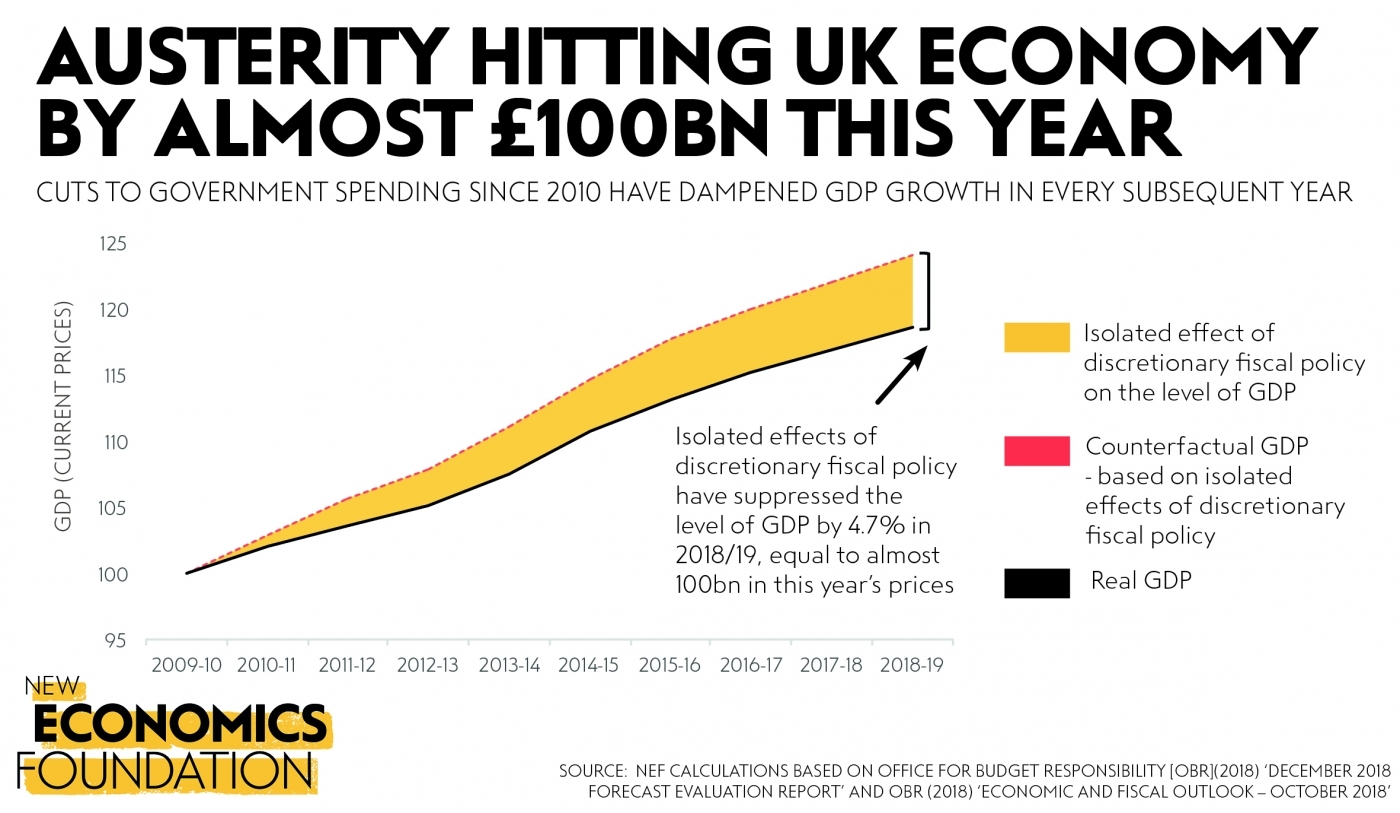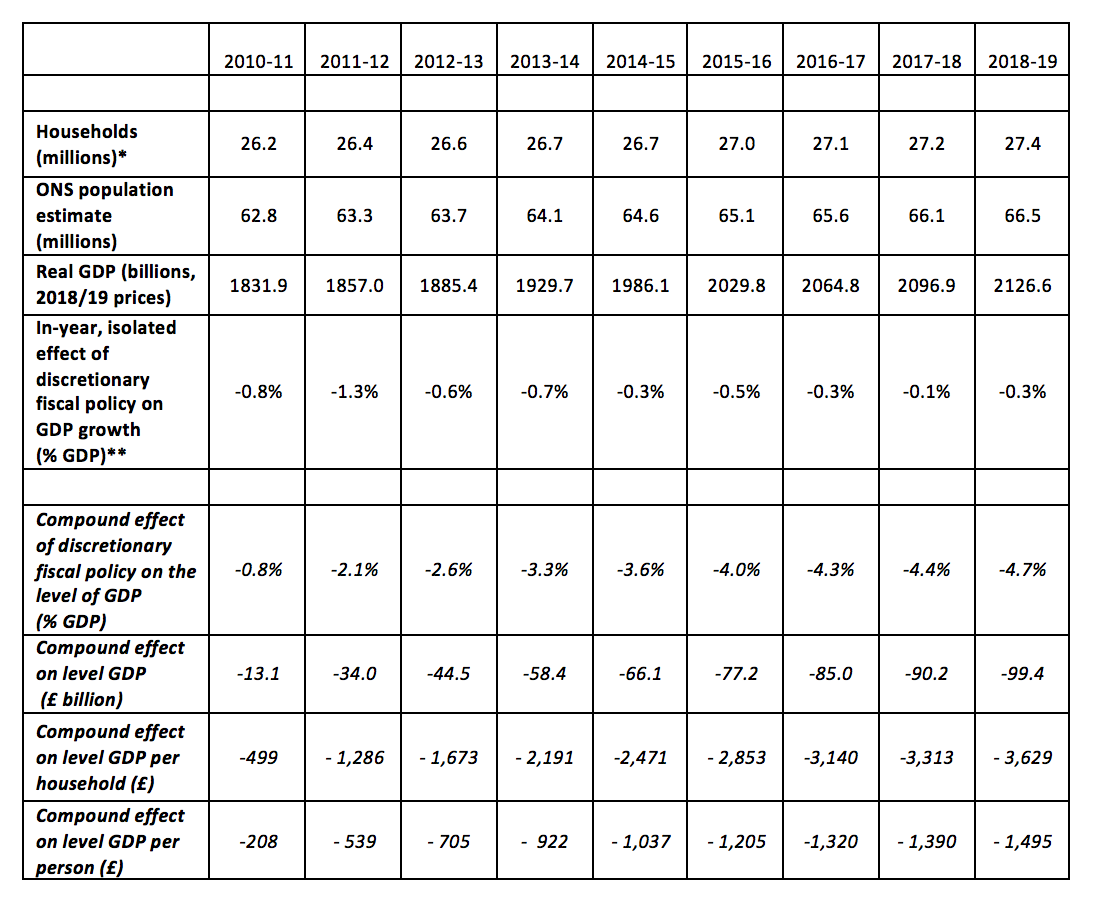Austerity hitting UK economy by almost £100bn this year — more than £3,600 per household
New NEF analysis shows cuts to government spending since 2010 have dampened GDP growth in every subsequent year
21 February 2019
Almost a decade of austerity has hit GDP per person by £1500 a year according to new analysis from the New Economics Foundation (NEF) – just over £3600 per household – . The analysis published today shows that the isolated effects of government policy have been to reduce GDP growth every single year since 2010. This has suppressed the level of GDP by just under £100bn (£99.4bn) in 2018/19.
The analysis notes that reduced government spending has also served to exacerbate existing economic imbalances by forcing household’s to increase their own borrowing to sustain GDP growth. The pursuit of deficit reduction via a policy of spending cuts has also proved a false economy in so far as the lower tax receipts from suppressed GDP have in turn contributed to numerous missed borrowing targets since 2010. The isolated effects of austerity to come are also expected to suppress GDP by a further £18bn, £117bn per year in total by 2022/23 (2018/19 prices).
Alfie Stirling, Head of Economic at the New Economics Foundation, said:
“At this time of year there is often renewed speculation over whether the Chancellor will meet his year-end deficit targets by March. But for 9 years, the elephant in the room has largely been missed: the sheer scale of economic damage that these targets have contributed to in the first place.
The human impacts have always been clearly visible for all to see – from rising homelessness to longer A&E waiting times. But now we can also get closer than ever before to measuring the impact on the economy as a whole – and using calculations that have even been rubber stamped by the government themselves.
“The big picture here is that the livelihoods of people and communities have been made more bleak as a direct consequence of active government decisions. This should not be allowed to happen again.”
Contact
Sofie Jenkinson, sofie.jenkinson@neweconomics.org 07981023031
Notes to Editors
A full overview of NEF’s new analysis can be found at at https://neweconomics.org/2019/02/austerity-hitting-uk-economy-by-almost-100bn-this-year
This new analysis uses figures from the Office for Budget Responsibility (OBR). Since 2017, assisted by work at the Institute for Fiscal Studies (IFS), the OBR have published the isolated effects of so called ‘discretionary fiscal policy’ – active government decisions over tax and spending – on GDP growth. New NEF analysis has compounded these in-year effects on growth to estimate the effect on the overall level of GDP, both in total and broken down per household and per individual in the economy (see table below).
This analysis pertains to the isolated effects of discretionary fiscal policy – active changes to levels of tax and spending – before taking into account any subsequent unwinding of these effects. Normally, the effects of fiscal policy would be expected to unwind over time, largely due to any necessary offsetting action taken from the Bank of England’s Monetary Policy Committee (MPC). However, there is a broad consensus among economists that the ability of the MPC to respond to negative shocks has diminished due to interest rates reaching their effective lower bound since 2009
NEF calculations are based on OBR (2018) ’December 2018 Forecast evaluation report – charts and tables’ https://obr.uk/fer/forecast-evaluation-report-december-2018/, OBR (2018) ‘Economic and fiscal outlook – October 2018’ https://obr.uk/efo/economic-fiscal-outlook-october-2018/, ONS (2017) ‘Families and households’ https://www.ons.gov.uk/peoplepopulationandcommunity/birthsdeathsandmarriages/families/datasets/familiesandhouseholdsfamiliesandhouseholds and ONS (2018)’ Overview of the UK population: November 2018’ https://www.ons.gov.uk/peoplepopulationandcommunity/populationandmigration/populationestimates/articles/overviewoftheukpopulation/november2018
Nine years of government austerity has had the effect of suppressing GDP by £100bn in 2018/19
Isolated impact of discretionary fiscal policy on real GDP (2010/11=100), 2010/11 to 2018/19

Source: NEF calculations based on Office for Budget Responsibility [OBR](2018) ‘December 2018 Forecast evaluation report – charts and tables’ https://obr.uk/fer/forecast-evaluation-report-december-2018/ and OBR (2018) ‘Economic and fiscal outlook – October 2018’ https://obr.uk/efo/economic-fiscal-outlook-october-2018/
Table of NEF calculations
Isolated impact of discretionary fiscal policy on real GDP, 2010/11 to 2018/19

Source: NEF calculations based on OBR (2018) ’December 2018 Forecast evaluation report – charts and tables’ https://obr.uk/fer/forecast-evaluation-report-december-2018/, OBR (2018) ‘Economic and fiscal outlook – October 2018’ https://obr.uk/efo/economic-fiscal-outlook-october-2018/, ONS (2017) ‘Families and households’ https://www.ons.gov.uk/peoplepopulationandcommunity/birthsdeathsandmarriages/families/datasets/familiesandhouseholdsfamiliesandhouseholds and ONS (2018)’ Overview of the UK population: November 2018’ https://www.ons.gov.uk/peoplepopulationandcommunity/populationandmigration/populationestimates/articles/overviewoftheukpopulation/november2018,
* The forecast for number of households has been estimated by assuming that the ratio of households to individuals in the population remains constant
** This is the isolated effect of discretionary fiscal policy – active changes in policy that affect tax and spending levels – before taking into account any subsequent unwinding of these effects. Normally, the effects of fiscal policy would be expected to unwind over time, largely due to any necessary offsetting action taken from the Bank of England’s Monetary Policy Committee (MPC). However, there is a broad consensus among economists that the ability of the MPC to respond to negative shocks has diminished due to interest rates reaching their effective lower bound since 2009
Topics Macroeconomics






